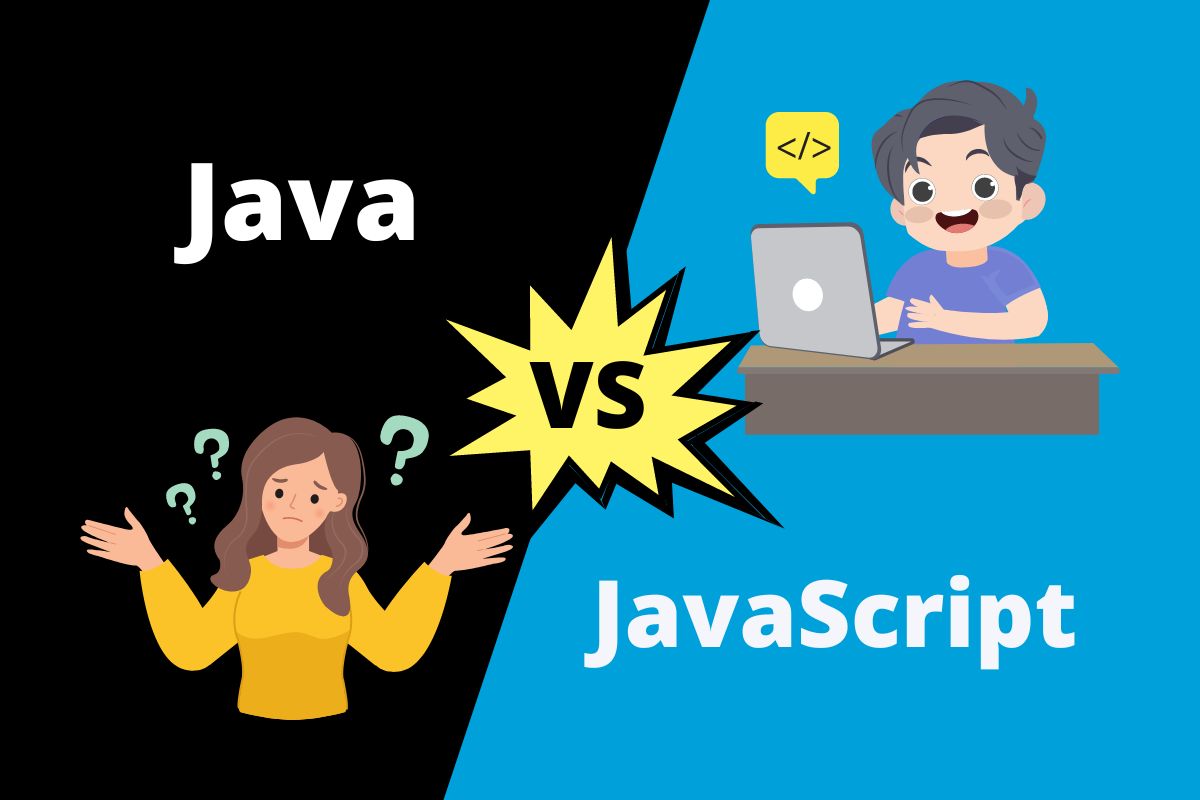The main difference between Java and JavaScript is that JavaScript is a scripting language, while Java is a programming language.
Java and JavaScript are two similar programming languages that often confuse people. This is primarily due to the word java in JavaScript. But they are very different in terms of history, features, uses, advantages, and disadvantages.
Table of Contents
Java vs JavaScript
| Java | vs | JavaScript |
| Programming language | Types Of Language | Scripting language |
| Standalone language | Is It A Standalone Language? | Not a standalone language |
| A web browser is not required to run Java programs. | Running Program | A web browser is essential to run JavaScript programs |
| Difficult to learn | Learning Curve | Easy to learn |
| Java requires a large amount of memory | File Extension | JavaScript does not require a large amount of memory |
| In Java, by utilizing multi-threading, you can perform complicated tasks. | Performance | In JavaScript, you can’t perform complicated tasks. |
| Java is stored on the host machine as the “byte” code. | Scoping | JavaScript is stored on the host machine as the “source” text. |
| It should be compiled before execution. | Compilation | It needs to be integrated into the HTML program for execution. |
| Strongly typed language | Typing | Loosely typed language |
| Programs are saved with the “.java” extension | Syntax | Programs in JavaScript are saved with the “.js” extension |
| Java is a pure object-oriented programming (OOP) language | Object Model | JavaScript is an object-based language |
What is Java?
Founded by James Gosling, Java is a general-purpose programming language launched with the promise “Write Once, Run Anywhere.” Sometimes, you might see the acronym WORA to describe this feature.
Java is a network-centric, multi-platform, and object-oriented programming language. It was first released by Sun Microsystems in 1991, which was later taken over by Oracle.
The Java programming language was initially used to program consumer electronics like VCRs. Java is among the most popular programming languages worldwide, with over 12 million programmers using it.
Java utilizes a Java Virtual Machine (JVM) feature, and any JVM machine installed can run Java.
Java’s Key Features
- While working with Java, you can write your code once and execute it on any computing platform for real-time testing.
- Java is ideal for building object-oriented applications.
- Java is a high-level and multithreaded language with automatic memory management.
- Being network-centric, it facilitates distributed computing.
- Java has no complex features like pointers, operator overloading, multiple inheritances, and explicit memory allocation.
Uses for Java
- Web development
- Software development
- Programming of hardware devices
- Scientific computing applications development
- Java is also used for server-side technologies, such as GlassFish, Apache, JBoss, etc.
What is JavaScript?
JavaScript is a lightweight programming language used to create interactive web pages. Unlike Java, JS is ideally a scripting language. It can insert dynamic text into HTML and is used in client-side and server-side web applications.
Javascript was created for DOM manipulation.
JavaScript’s Key Features
- JavaScript is a cross-platform language. Thus, every JavaScript code runs equally on any operating system, such as Linux, macOS, Windows, etc.
- JavaScript doesn’t need any compiler to run.
- It’s suitable for server-side and client-side.
- JS is easier to learn and master in a quick time.
- Added dependencies (i.e., third-party codes your program depends upon)
Uses for JavaScript
- JavaScript forms the base of numerous server-side technologies, for example, MongoDB, Node.js, and Express.js.
- You can develop Dynamic Single-Page Applications (SPAs) using JS.
- The language can also be preferred for mobile app development using PhoneGap, React Native, etc.
- Most front-end technologies are based on JavaScript. For instance, jQuery, Ember.js, ReactJS, etc.

Difference Between Java and JavaScript
Java and JavaScript serve different purposes. Here are a few key differences between Java and JavaScript based on various parameters.
Features of the Language
Java is a standalone programming language, whereas JavaScript is a scripting language and isn’t a standalone language. JavaScript is easier to learn than Java. This is because you can execute even complex code in small parts on the web browser, which isn’t possible in Java.
Tech giants like Infosys, TCS, and Wipro use Java to develop software and websites, as it’s counted as the most secure programming language in the world.
Running Platform
You don’t need a web browser to run Java programs. However, a web browser is essential to run JavaScript programs.
Java programs should be compiled before execution, whereas JavaScript needs to be integrated into an HTML program for execution.
 Java and JavaScript are Very Different
Java and JavaScript are Very Different
Java was designed as an all-purpose program for building standalone applications. On the other hand, JavaScript is a scripting language built specifically to interface with web technologies, namely HTML.
Overall, Java is considered to be a more difficult language to master than JavaScript.
It’s pretty clear that Java and JavaScript are not similar. Java has no relation to JavaScript, even though the name is similar.
If you’ve enjoyed this article, check out our post comparing C++ and C.

